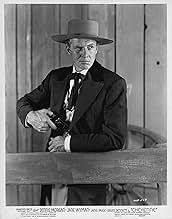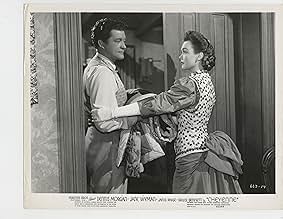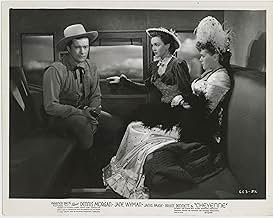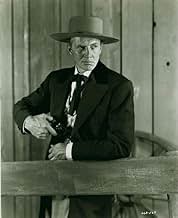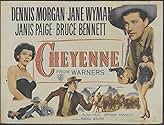To avoid going to trial, a gambler becomes a detective for an insurance company to find out who is robbing the stages.To avoid going to trial, a gambler becomes a detective for an insurance company to find out who is robbing the stages.To avoid going to trial, a gambler becomes a detective for an insurance company to find out who is robbing the stages.
- Director
- Writers
- Stars
- Awards
- 1 win total
Anne O'Neal
- Miss Kittredge
- (as Ann O'Neal)
Robert Alderette
- Shotgun Rider
- (uncredited)
Hubert Brill
- Card Expert
- (uncredited)
- Director
- Writers
- All cast & crew
- Production, box office & more at IMDbPro
Featured reviews
That's how you supposedly pronounce Cheyenne. Wanted man Dennis Morgan (Jim) is given a second chance by lawman Barton MacLane (Yancey) if Morgan heads to Shy-Anne and leads him to "The Poet" who is robbing stagecoaches. This poet is even upsetting the local bad gang headed up by Arthur Kennedy (Sundance). Every time Sundance pulls a robbery, "The Poet" has beaten him to it and left him a poem in the treasure trunk. Every time. Ha ha. That's pretty cheeky. Anyway, Kennedy wants to team up with this guy and carry out some big hold-ups. Morgan has to find and capture the poet and gets involved with a couple of ladies on the way – Jane Wyman (Ann) and Janis Paige (Emily). You know these two ladies are going to figure in the story just a little more than on that initial stagecoach ride into Shy-Anne
.
This film is entertaining and contains a great saloon song – "Going Back to Old Cheyenne" – as sung by Janis Paige. The film leads you through its journey with action, drama, comedy and various set pieces and the overall result is a good western.
This film is entertaining and contains a great saloon song – "Going Back to Old Cheyenne" – as sung by Janis Paige. The film leads you through its journey with action, drama, comedy and various set pieces and the overall result is a good western.
Critics like Phil Hardy have tended to dismiss Cheyenne as the least of Walsh's Westerns. My own viewing suggests a reassessment is in order. I saw this movie with another Walsh title, the more highly esteemed Along The Great Divide, just afterwards and was struck by how much more interesting, playful and modern the former appeared. By contrast Divide seemed predictable and more schematic.
The barely concealed sexual nature of much of the banter between hero Dennis Morgan (Wylie) and the two women he encounters - particularly Jane Wyman (Ann) who, for a period, poses as his wife - as well as the episodic nature of the plot is what gives the film its particular flavour today.
Another attraction is that like other Walsh Westerns (Pursued, Colorado Territory etc) noir elements are also prominent in Cheyenne. The overriding tone is cynical and Morgan's own predicament, as a man who has to solve a crime to clear himself of his own past, brings with it a background air of persecution closely related to that other, typically urban, genre. Ann has the air of a femme fatale, while the Sundance Kid (another marvellously laid back performance by Arthur Kennedy) insinuates suitable menace. In fact, I found his demise somewhat surprising as I would normally expect such a strong character to last to the showdown at the end of the film.
One of the most impressive scenes in the film is when Wylie and Ann face the returning robbers in the ramshackle hut they have shared with them the night before. The gunfight that follows is done imaginatively, while Walsh's talent as director are fully on display as he creates suspense through cutting and framing. At this time Wylie and Ann are still carrying on the husband and wife pretence which adds a further level of tension to the proceedings.
If there is a problem with the film it is in the occasional jarring nature of tone. Scenes follow each other that are menacing, flirtatious and comic. This creates a feeling of unease for the viewer that was perhaps deliberate, but the sudden gear change can also just be disconcerting. The musical score is outstanding as is the cinematography and both add immeasurably to the quality of the production.
Dennis Morgan made more impact on me in this film than he ever has before - perhaps because I have never looked out for him in particular. Here he is surprisingly muscular, a worthy foil for the machinations of the chief villain The Poet. The Poet's precise relationship to his wife is one of the most intriguing aspects of the early part of the film. Morgan's own teasing relationship with the two women he meets on the stage (both at the start and again at the conclusion of the film - a nice circular touch) is also interesting and provoking. Far more than the stereotypical Good girl/Bad Girl duality that appears in B-Western plots, the two women represent something more sophisticated and interesting, something that keeps the viewer interested.
This may be a forgotten film today, but if you like Westerns it is one definitely worth making an effort to see. It is not on the level of Walsh's very finest work but is still a good film, one in which the varied plot line and adult 'knowingness'of the leads give great enjoyment.
The barely concealed sexual nature of much of the banter between hero Dennis Morgan (Wylie) and the two women he encounters - particularly Jane Wyman (Ann) who, for a period, poses as his wife - as well as the episodic nature of the plot is what gives the film its particular flavour today.
Another attraction is that like other Walsh Westerns (Pursued, Colorado Territory etc) noir elements are also prominent in Cheyenne. The overriding tone is cynical and Morgan's own predicament, as a man who has to solve a crime to clear himself of his own past, brings with it a background air of persecution closely related to that other, typically urban, genre. Ann has the air of a femme fatale, while the Sundance Kid (another marvellously laid back performance by Arthur Kennedy) insinuates suitable menace. In fact, I found his demise somewhat surprising as I would normally expect such a strong character to last to the showdown at the end of the film.
One of the most impressive scenes in the film is when Wylie and Ann face the returning robbers in the ramshackle hut they have shared with them the night before. The gunfight that follows is done imaginatively, while Walsh's talent as director are fully on display as he creates suspense through cutting and framing. At this time Wylie and Ann are still carrying on the husband and wife pretence which adds a further level of tension to the proceedings.
If there is a problem with the film it is in the occasional jarring nature of tone. Scenes follow each other that are menacing, flirtatious and comic. This creates a feeling of unease for the viewer that was perhaps deliberate, but the sudden gear change can also just be disconcerting. The musical score is outstanding as is the cinematography and both add immeasurably to the quality of the production.
Dennis Morgan made more impact on me in this film than he ever has before - perhaps because I have never looked out for him in particular. Here he is surprisingly muscular, a worthy foil for the machinations of the chief villain The Poet. The Poet's precise relationship to his wife is one of the most intriguing aspects of the early part of the film. Morgan's own teasing relationship with the two women he meets on the stage (both at the start and again at the conclusion of the film - a nice circular touch) is also interesting and provoking. Far more than the stereotypical Good girl/Bad Girl duality that appears in B-Western plots, the two women represent something more sophisticated and interesting, something that keeps the viewer interested.
This may be a forgotten film today, but if you like Westerns it is one definitely worth making an effort to see. It is not on the level of Walsh's very finest work but is still a good film, one in which the varied plot line and adult 'knowingness'of the leads give great enjoyment.
There is nothing particularly wrong or bad about "Cheyenne". But, for that matter, there's not all that right or good about it either. It seems just okay in most every way....and I think part of it is because both Dennis Morgan and Jane Wyman seemed a bit out of place in the leads.
When the story begins, professional gambler James Wylie (Morgan) is approached with a proposition....to find 'The Poet' or else! Well, he didn't like the 'or else' so he travels to the next town to look for the identiy of this bandit who has robbed many stage coaches. Along the way, he hooks up with a lady who doesn't particularly like him (Wyman) and eventually he sorts it all out and there is, of course, a happy ending.
Despite being directed by Raoul Walsh, the film seemed a bit long and dull to me. I have a hard time putting my finger on exactly what left me rather cold about this one...but it rarely seemed interesting and long before it was finished I found myself getting bored despite it being a polished Warner Brothers production.
By the way, if you do watch it, at about 89 minutes into the film, a gang jumps on their horses and gives chase. One of the folks giving chase has his hat fly off...but when they catch up to the guy, they all are wearing hats!
When the story begins, professional gambler James Wylie (Morgan) is approached with a proposition....to find 'The Poet' or else! Well, he didn't like the 'or else' so he travels to the next town to look for the identiy of this bandit who has robbed many stage coaches. Along the way, he hooks up with a lady who doesn't particularly like him (Wyman) and eventually he sorts it all out and there is, of course, a happy ending.
Despite being directed by Raoul Walsh, the film seemed a bit long and dull to me. I have a hard time putting my finger on exactly what left me rather cold about this one...but it rarely seemed interesting and long before it was finished I found myself getting bored despite it being a polished Warner Brothers production.
By the way, if you do watch it, at about 89 minutes into the film, a gang jumps on their horses and gives chase. One of the folks giving chase has his hat fly off...but when they catch up to the guy, they all are wearing hats!
Dennis Morgan was a very handsome dude and his acting was quite all right. Jane Wyman also already showed her acting talent in this movie. Outlaw bandits on horses robbing the stagecoaches or the banks were the typical major western genre since day one. Adding some convenient romance was also pretty typical arrangement for the handsome leading male and female characters was an inevitable ingredient almost in every western movie other than the gun fights or a final show down.
But what I have to point out again and again for the earlier western movies, the deafening, overly played soundtrack, the score, usually through those whole movies soon as the movies started. At that time, these movie companies used to hire contractual orchestras to play the music specifically scored for each movie. Boy Oh boy, weren't them not just loud and most of the time so inappropriate and exaggerated. Every scene would sync and combine with music, but most of the time, absolutely unnecessary and over-killed.
The soundtrack in this 1947 western was exceptionally loud, annoying and inappropriate, almost like military marching music specially drafted. The music in this movie undoubtedly can be used in those WWII war movies and might be more appropriate. Battleships sailed to battle with the German or Japanese navy forces, or bombers taking off one by one to cross the English Channel on the missions to bomb German military industries.
But for the mercy of God, instead of battleships or bombers set off to the battleground, the military like musical soundtrack in this film was used just on a stagecoach with only three passengers on it and one driver and one supporting shotgun beside him as well as several bandits on the horses rushing down the hill to rob the stagecoach. This kinda music and scores later were so blindly used on Walter Disney's cartoons to sync every movement of the cartoons' caricatures, making the western movies without any big difference from cartoons. For this movie, I have to turn down the volume almost to nothing to allow me to watch on.
But what I have to point out again and again for the earlier western movies, the deafening, overly played soundtrack, the score, usually through those whole movies soon as the movies started. At that time, these movie companies used to hire contractual orchestras to play the music specifically scored for each movie. Boy Oh boy, weren't them not just loud and most of the time so inappropriate and exaggerated. Every scene would sync and combine with music, but most of the time, absolutely unnecessary and over-killed.
The soundtrack in this 1947 western was exceptionally loud, annoying and inappropriate, almost like military marching music specially drafted. The music in this movie undoubtedly can be used in those WWII war movies and might be more appropriate. Battleships sailed to battle with the German or Japanese navy forces, or bombers taking off one by one to cross the English Channel on the missions to bomb German military industries.
But for the mercy of God, instead of battleships or bombers set off to the battleground, the military like musical soundtrack in this film was used just on a stagecoach with only three passengers on it and one driver and one supporting shotgun beside him as well as several bandits on the horses rushing down the hill to rob the stagecoach. This kinda music and scores later were so blindly used on Walter Disney's cartoons to sync every movement of the cartoons' caricatures, making the western movies without any big difference from cartoons. For this movie, I have to turn down the volume almost to nothing to allow me to watch on.
It was all said above. This is a rewarding movie to watch with good depth. I'd just like to add that the removal of Arthur Kennedy half way through the film, just as Alan Hale finally makes an entrance, is interesting. It's almost as though Raoul was having a hard time with Mr. Kennedy and had a part written to replace him with the `Skipper's' dad.
The ending is a wee bit of a surprise only because just as it looks like thing may not turn out the way we expect them too, they do. Yes Mr. Walsh did make many memorable westerns (I've seen the majority of them) but it's almost as though he was trying to move into another direction with this picture. Weather audiences appreciated it or not are still to be seen.
Scotty Jensen Racine, WI. USA
The ending is a wee bit of a surprise only because just as it looks like thing may not turn out the way we expect them too, they do. Yes Mr. Walsh did make many memorable westerns (I've seen the majority of them) but it's almost as though he was trying to move into another direction with this picture. Weather audiences appreciated it or not are still to be seen.
Scotty Jensen Racine, WI. USA
Did you know
- TriviaThe TV series Cheyenne (1955) starring Clint Walker was supposedly based on this film, although there is no actual connection beyond Warner Brothers' owning the title.
- GoofsWhen Ed Landers turned around to shoot uphill at James Wylie who was coming in behind him, his gun went off before he was turned halfway around, when it was still pointed at the ground.
- Quotes
The Sundance Kid: When are we gonna start workin' together?
James Wylie: I'll tell you when just as soon as I finish my honeymoon.
The Sundance Kid: You already had one.
James Wylie: We want another one. You know how women are - like bears, they never get enough honey.
- ConnectionsFeatured in Frances Farmer Presents: Wyoming Kid (1958)
- How long is Cheyenne?Powered by Alexa
Details
- Release date
- Country of origin
- Language
- Also known as
- Los bolsillos del diablo
- Filming locations
- Sedona, Arizona, USA(environs used for Wyoming locations)
- Production company
- See more company credits at IMDbPro
Box office
- Budget
- $1,929,000 (estimated)
- Runtime
- 1h 39m(99 min)
- Color
- Aspect ratio
- 1.37 : 1
Contribute to this page
Suggest an edit or add missing content


